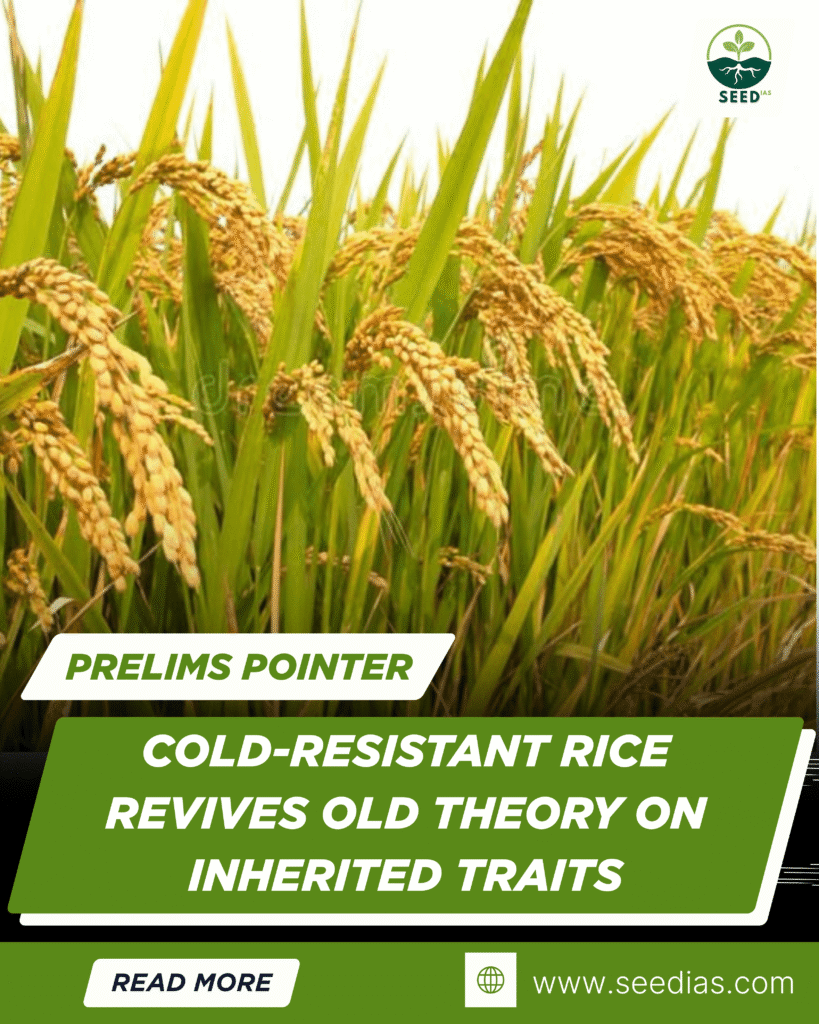Why in NEWS
A groundbreaking study on rice plants has shown that exposure to cold temperatures can trigger epigenetic changes that are heritable for five generations—offering real-world support to Jean-Baptiste Lamarck’s 1809 theory of the inheritance of acquired traits.
The finding challenges long-held beliefs in classical genetics and highlights how environmental stress can cause heritable changes without altering DNA.
Key Concepts
| Term/Concept | Description |
|---|---|
| Epigenetics | The study of heritable gene expression changes caused by external/environmental factors without altering DNA sequence. |
| Lamarck’s Theory (1809) | Traits acquired during an organism’s life due to use/disuse or environment could be inherited. |
| Natural Selection (Darwin, 1859) | Evolution occurs through genetic variation and survival advantage, not acquired traits. |
| Weismann’s Experiment (1890s) | Removing mice tails did not affect offspring’s tails—disproving Lamarckian inheritance. |
| Mendelian Genetics | Traits are passed via genes, not environmental adaptations. |
| Epigenetic Marks | Chemical tags (e.g., methyl groups) on DNA that regulate gene activity, and can be inherited. |
News in Simple Terms
- Rice plants exposed to cold developed tolerance via epigenetic changes.
- These changes were inherited by five generations—without changes to DNA.
- This supports the once-dismissed Lamarckian idea that environmental influences can shape heredity.
- Though Darwin and Mendel had discredited Lamarck’s ideas, epigenetics now offers a modern reinterpretation of his theory.
Scientific Evolution of the Idea
| Milestone / Scientist | Key Contribution |
|---|---|
| Jean-Baptiste Lamarck (1809) | Proposed that traits acquired due to environment can be inherited. |
| Charles Darwin (1859) | Rejected acquired traits; introduced natural selection via inherited genetic variation. |
| August Weismann (1890s) | Cut mouse tails over generations — tails still appeared, disproving Lamarck. |
| Gregor Mendel | Identified genes as the basic units of inheritance. |
| Royal Brink (1956) | First demonstrated epigenetic inheritance in maize. |
| Arthur Riggs (1975) | Suggested chemical modifications on DNA (not changes to sequence) could cause heritable traits. |
In a Nutshell
Memory Code: “L.E.A.R.N.S”
L – Lamarck’s theory re-evaluated
E – Epigenetics enables heritable change
A – Acquired trait (cold tolerance) passed down
R – Rice study validates concept
N – Non-DNA inheritance proves possible
S – Science revisits the past with modern tools
Prelims Practice Questions
- Which of the following best defines epigenetics?
A. Mutation in DNA sequence
B. Inheritance through acquired traits only
C. Heritable changes in gene expression without altering DNA
D. Transmission of dominant traits through Mendelian laws - Whose experiment disproved Lamarck’s theory by showing that acquired traits are not inherited?
A. Charles Darwin
B. Royal Brink
C. Gregor Mendel
D. August Weismann - What was the key finding in the rice cold tolerance study?
A. DNA sequence was permanently changed
B. Rice became cold-tolerant via selective breeding
C. Cold tolerance was acquired and inherited epigenetically
D. Hybrid seeds were genetically modified
Prelims Answers with Explanation
| Q No. | Answer | Explanation |
|---|---|---|
| 1 | C | Epigenetics involves gene expression changes without changing DNA. |
| 2 | D | August Weismann’s mouse tail experiment refuted Lamarck’s idea. |
| 3 | C | The study showed cold tolerance acquired through epigenetics and inherited. |














